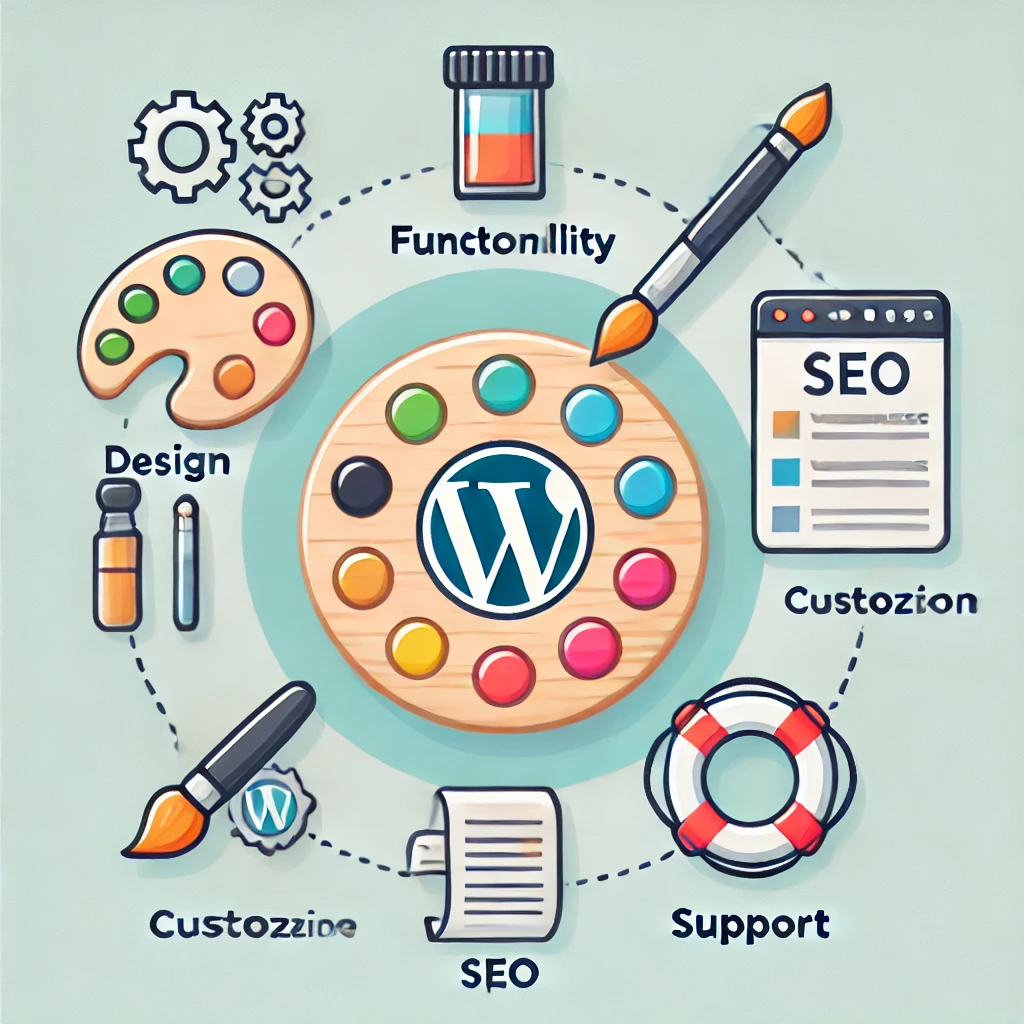
Choosing the perfect WordPress theme for a specific business niche is crucial to creating a website that not only looks professional but also provides the necessary functionality to engage users and support your business goals. With thousands of WordPress themes available, the challenge is finding one that fits your niche and meets your requirements in terms of design, functionality, and customization. Here’s a guide to help you choose the ideal theme for your specific business niche:
1. Understand Your Business Needs
Before diving into theme options, take time to clearly understand what your business needs from its website. Consider the following:
- Target Audience: Who will be visiting your site? A corporate law firm will need a different style than a fitness studio.
- Type of Content: Will your site feature a blog, a portfolio, products for sale, or a booking system? Knowing your content type helps in choosing the right structure.
- Business Goals: Are you looking to generate leads, sell products, or showcase your work? Your theme should align with these goals.
2. Prioritize Design with Your Niche in Mind
The design of your website must resonate with your audience and be appropriate for your business niche. Here are key design factors to consider:
- Layout: Choose a layout that suits your content. For instance, a photography website should prioritize large, high-quality images, while a blog might need a clean, text-heavy layout with easy-to-read fonts.
- Color Scheme: Different niches often have color schemes that work best. For example, a health and wellness website might use soothing, natural colors, while a tech company may lean toward modern, sleek designs with neutral tones.
- Typography: Make sure the fonts are appropriate for your niche. A fashion blog might use more stylish, creative fonts, while a law firm would benefit from professional, conservative typography.
- Responsive Design: Ensure the theme is mobile-friendly, as more users are browsing websites via smartphones. It’s essential that your design adapts seamlessly to different screen sizes.
3. Focus on Functionality Based on Your Niche
Depending on your business, you may need specific functionality from your theme. Look for themes that either have built-in functionality or integrate easily with plugins. Consider:
- E-commerce: If you’re running an online store, you’ll need a theme that’s WooCommerce-compatible, allowing you to manage products, cart systems, and payment gateways smoothly.
- Portfolio Display: Creative professionals (e.g., photographers, designers) need themes with portfolio layouts to showcase work in a visually compelling way.
- Booking Systems: Businesses such as salons, restaurants, or consultancy firms should prioritize themes that integrate well with booking plugins.
- Membership or Subscription: For businesses offering premium content or services, themes that support membership systems and restrict content to logged-in users are essential.
4. Customization Options
A good WordPress theme should offer a balance between pre-designed templates and customization flexibility. Look for themes that offer the following:
- Page Builders: Themes that are compatible with page builders like Elementor, WPBakery, or Gutenberg allow for easier, drag-and-drop customization without needing to code.
- Custom Widgets: Some themes come with custom widgets for social media integration, contact forms, or galleries that can be placed in various sections of your website.
- Theme Options Panel: Many premium themes come with their own theme options panel, allowing you to adjust colors, fonts, layouts, and more without needing advanced technical skills.
- Custom Post Types: If your niche requires different content types (e.g., real estate listings, testimonials, events), look for themes that support custom post types.
5. SEO and Performance Optimization
No matter your niche, SEO and performance are critical factors for the success of your website. Your theme should be built with clean, semantic code to ensure search engines can crawl and index your site efficiently. Additionally:
- SEO-Friendly: Look for themes that advertise SEO-optimized code. These themes usually integrate well with popular SEO plugins like Yoast SEO.
- Speed Optimization: A slow website can turn users away and harm your rankings. Ensure the theme is optimized for performance, including fast loading times and proper image handling.
- Cross-Browser Compatibility: The theme should function properly across all major browsers (Chrome, Safari, Firefox, etc.) to provide a consistent user experience.
6. Support and Updates
A WordPress theme is not a one-time purchase but an ongoing investment. Make sure the theme you choose comes from a reputable developer who offers:
- Regular Updates: Themes should be updated regularly to ensure compatibility with the latest WordPress version and plugins.
- Customer Support: Check whether the theme includes access to customer support, documentation, or user forums. This is particularly important if you’re not familiar with web development.
- User Reviews and Ratings: Before choosing a theme, look at reviews from other users. This can give you insight into potential problems and the overall quality of the theme.
7. Premium vs. Free Themes
While free themes can be attractive, premium themes generally offer more features, better design, and dedicated support. If your niche requires advanced functionality or specific designs, investing in a premium theme is often worthwhile. However, some free themes can work perfectly for simple websites, especially when paired with the right plugins.
8. Test Before Committing
Once you’ve shortlisted potential themes, it’s essential to test them. Most themes offer a live demo, so explore the demo sites, pay attention to design details, and make sure it fits your vision. You can also test the theme in your WordPress dashboard using the Theme Customizer before making any final decisions.
Choosing the perfect WordPress theme for your business niche comes down to finding the right balance of design, functionality, and customization. Always keep your target audience and business goals in mind as you browse through themes. Don’t hesitate to invest in a premium theme if it meets all your requirements, and make sure the theme is regularly updated, SEO-friendly, and flexible enough to grow with your business. By taking the time to choose the right theme, you’ll set the foundation for a successful and professional online presence

